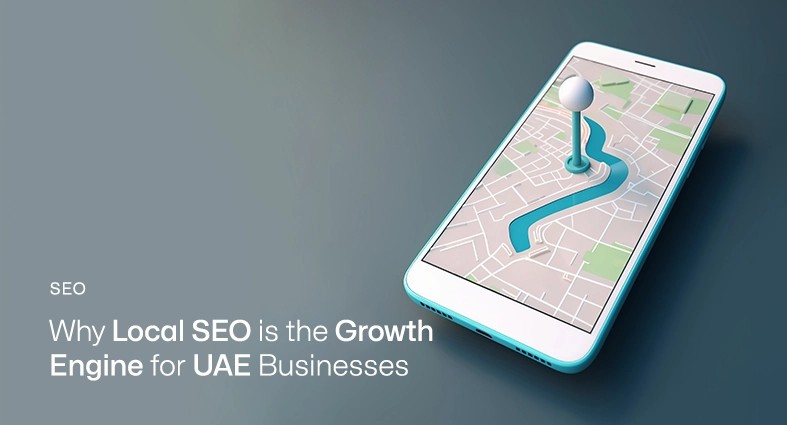Nestled in the vibrant city of Abu Dhabi, businesses are realizing the immense significance of local SEO in capturing the hearts and attention of their local customers. Leveraging local SEO techniques is crucial to effectively target and capture the attention of local customers who are actively seeking products or services in their vicinity. Local SEO plays a vital role in improving businesses’ visibility in local search results, making it easier for potential customers in Abu Dhabi to find and connect with them. When users search for specific products or services in their local area, search engines use a combination of factors to determine the most relevant results to display. Local SEO techniques ensure that businesses in Abu Dhabi have the best chance of appearing in these search results, increasing their visibility, and attracting highly targeted organic traffic. In this guide, we will delve into the world of local SEO and explore the specific techniques that can help businesses in Abu Dhabi unlock the full potential of their local online presence.
Understanding Local SEO
Local SEO is a specialized branch of search engine optimization that focuses on optimizing a website’s online presence to target geographically specific audiences. Unlike traditional SEO, which aims to improve a website’s visibility on a global or national scale, local SEO aims to enhance visibility within a specific geographic location, such as Abu Dhabi. Local SEO involves a set of practices and techniques aimed at improving a business’s online visibility within a specific location. It focuses on optimizing various elements, including website content, online directories, and Google My Business listings, to attract local customers who are actively searching for products or services in a specific geographic area. The primary goal of local SEO is to ensure that when potential customers search for businesses or services within their locality, the business appears prominently in the search results, increasing the likelihood of attracting local customers and driving foot traffic to physical stores.
Optimizing Google My Business Listing
One of the first steps in local SEO is claiming and optimizing the Google My Business (GMB) listing. GMB is a powerful tool that allows businesses to manage their online presence on Google, including search and map results. By claiming the listing, businesses can ensure that accurate and up-to-date information is displayed to potential customers. Optimizing the GMB listing involves providing complete and consistent business information, such as the name, address, and phone number (NAP). Additionally, selecting relevant categories, adding attractive visuals, and encouraging customer reviews can significantly enhance the listing’s visibility and credibility.
Importance of Claiming and Verifying GMB
Claiming and verifying your GMB listing is the first essential step in optimizing your online presence. By claiming ownership of your listing, you gain control over the information that appears in search results, ensuring its accuracy and completeness. Verifying your listing authenticates your business and builds trust with potential customers. Verified listings are also more likely to appear in Google’s Local Pack and Google Maps, enhancing your visibility and increasing the likelihood of attracting local customers.
Optimizing Business Information
When optimizing your GMB listing, it is crucial to provide accurate and consistent business information, often referred to as NAP (Name, Address, Phone number). Ensure that the business name is entered exactly as it appears in other online directories or listings. The address should be complete and precise, including the city and postal code. Providing a local phone number reinforces your local presence. Consistency across your GMB listing and other online directories reinforces the credibility of your business and helps search engines understand your location, increasing the likelihood of appearing in local search results.
Utilizing Relevant Categories and Attributes
Selecting the most appropriate categories and attributes for your business is vital for optimizing your GMB listing. Categories allow you to specify the industry or nature of your business, helping search engines understand your offerings and connect you with relevant search queries. Additionally, utilizing attributes can provide additional information about your business, such as whether you offer delivery services, accept online bookings, or have specific accessibility features. These attributes help potential customers make informed decisions and improve your visibility in search results.
Encouraging Customer Reviews
Positive reviews not only attract potential customers but also influence search engines in determining the relevance and prominence of your business in local search results. Actively encourage satisfied customers to leave reviews on your GMB listing, as well as on other relevant platforms. Responding to both positive and negative reviews demonstrates your attentiveness and dedication to customer satisfaction. Timely and professional responses show potential customers that you value their feedback and are committed to providing excellent products or services.
Localizing Website Content
To improve local search visibility, businesses in Abu Dhabi should incorporate local keywords throughout their website content. By targeting location-specific keywords related to their products or services, businesses can increase their chances of appearing in local search results. Creating location-specific landing pages that highlight services or products tailored to different areas within Abu Dhabi can also improve local visibility. Furthermore, including local contact information, embedding Google Maps, and using schema markup can provide search engines with localized information, boosting the website’s relevancy and visibility.
Incorporating Local Keywords
One of the key aspects of localizing website content is incorporating local keywords strategically. Businesses should conduct thorough keyword research to identify relevant local keywords that potential customers in Abu Dhabi are using to search for products or services. By seamlessly integrating these keywords into website content, such as page titles, headings, meta descriptions, and body text, businesses can signal to search engines the local relevance of their website, thereby improving their chances of appearing in local search results.
Creating Location-Specific Landing Pages
Another effective strategy for localizing website content is creating location-specific landing pages. Businesses in Abu Dhabi may have multiple physical locations or cater to different areas within the city. These location-specific landing pages can include relevant information such as address, contact details, operating hours, and any other pertinent details that are specific to each location. This allows businesses to target potential customers in different areas of Abu Dhabi and improve their visibility in local search results for those specific locations.
Including Local Contact Information and Location-Specific Details
Incorporating local contact information and location-specific details is another important aspect of localizing website content. Additionally, providing accurate and detailed information about each location, such as nearby landmarks or transportation options, can further enhance the user experience and make it easier for customers to find and engage with the business.
Adding Schema Markup
Schema markup is a structured data vocabulary that allows businesses to provide additional context and information to search engines. By incorporating schema markup on their website, specifically using local business schema markup, businesses can provide search engines with localized information about their business, such as the specific areas they serve, the types of services offered, operating hours, and customer reviews. This enables search engines to better understand the local relevance of the business and display more accurate and detailed information in search results, increasing the chances of attracting potential customers who are specifically searching for local businesses in Abu Dhabi.
Building Local Citations and Backlinks
Local citations and backlinks are essential components of local SEO. Citations are mentions of a business’s NAP information on online directories and listings. Ensuring consistency and accuracy across various directories helps search engines recognize and validate the business’s local presence. Acquiring backlinks from local websites and relevant industry sources further establishes credibility and authority. These tactics contribute significantly to improving a business’s visibility in local search results and strengthening its online reputation.
The Importance of Local Citations
Local citations are mentions of a business’s name, address, and phone number (NAP) across various online directories, listings, and platforms. These citations play a crucial role in local SEO as they serve as signals to search engines, confirming the legitimacy and relevance of a business in a specific location. Search engines rely on consistent and accurate NAP information to determine the credibility and authority of a business in the local search ecosystem.
Creating Consistent NAP Citations
To maximize the impact of local citations, it is vital to ensure consistency and accuracy across all online directories and listings. This means that the business’s NAP information should be identical in each citation, leaving no room for discrepancies. Inconsistencies, such as variations in spelling, abbreviations, or different phone numbers, can confuse search engines and potential customers, leading to a negative impact on local search rankings.
Acquiring Backlinks from Local Websites
Backlinks, also known as inbound links, are links from external websites that point to a business’s website. In the context of local SEO, acquiring backlinks from local websites and relevant industry sources is crucial for building authority and trust in the eyes of search engines. Local backlinks signal to search engines that the business is connected to the local community and has relevance within the target location. For example, if a local news publication or a reputable local business links to a business’s website, it indicates that the business is a trusted entity within the local ecosystem. These local backlinks act as endorsements, enhancing the business’s local search visibility and overall search engine rankings.
Utilizing Local Directories and Review Platforms
Local directories and review platforms are valuable assets for businesses aiming to boost their local visibility. These platforms, such as Yelp, TripAdvisor, and Google My Business, allow businesses to create profiles and provide relevant information to potential customers. They also enable customers to leave reviews and ratings, which not only influence potential customers but also serve as signals to search engines. Positive reviews and high ratings can enhance a business’s local search rankings, while active engagement and timely responses demonstrate excellent customer service and bolster the business’s reputation.
Leveraging Online Reviews and Reputation Management
Encouraging customers to leave reviews on platforms such as Google and industry-specific review sites not only influences potential customers but also sends positive signals to search engines. Responding to both positive and negative reviews in a timely and professional manner showcases a business’s commitment to customer satisfaction. Additionally, monitoring and managing online reputation through proactive strategies helps maintain a positive brand image and builds trust among potential customers.
Encouraging Customer Reviews
Encouraging customers to leave reviews is a powerful way to build a positive online reputation. Satisfied customers who have had a great experience with a business are often willing to share their feedback and endorse the brand. Businesses can proactively request reviews from customers through various channels, such as follow-up emails, social media engagement, or a dedicated section on their website.
Responding to Both Positive and Negative Reviews
Responding to reviews, whether positive or negative, is crucial for demonstrating a business’s commitment to customer satisfaction and engagement. When a customer takes the time to leave a positive review, businesses should express gratitude and acknowledge the positive experience. This not only reinforces the positive impression but also encourages others to share their positive experiences. Similarly, addressing negative reviews in a professional and empathetic manner shows that the business values customer feedback and is willing to address concerns or rectify any issues.
Monitoring and Managing Online Reputation
Maintaining a proactive approach to monitoring and managing online reputation is paramount for businesses in Abu Dhabi. Regularly monitoring platforms like Google, social media channels, and industry-specific review sites allows businesses to stay informed about customer feedback and sentiments. This vigilance enables them to promptly address any negative reviews or respond to customer inquiries. Additionally, using online reputation management tools and services can streamline the process of monitoring and managing a business’s online reputation. These tools provide insights into brand mentions, sentiment analysis, and overall online reputation health, enabling businesses to make informed decisions and take appropriate actions to maintain a positive brand image.
Leveraging Customer Feedback
Customer feedback is a valuable resource for businesses, offering insights into areas of improvement and identifying potential strengths. Leveraging customer feedback involves analyzing the feedback received and using it to refine products, services, and customer experience. Businesses can identify common themes or recurring suggestions to make meaningful enhancements to their offerings.
Localizing Social Media Presence
Social media platforms offer excellent opportunities for businesses in Abu Dhabi to engage with their local audience. When it comes to local SEO, businesses in Abu Dhabi must localize their social media presence to effectively engage with the local community. Participating in local community events, engaging with local influencers, using location-specific hashtags, and sharing locally relevant content and promotions helps establish a strong local presence on social media platforms.
Participating in Local Community Events
Engaging with the local community is a powerful way to establish a genuine connection with potential customers. By participating in local events, such as festivals, charity drives, or networking gatherings, businesses can showcase their commitment to the community and build trust. These events provide opportunities for face-to-face interactions, allowing businesses to form personal connections and generate positive word-of-mouth. By actively participating in local community events, businesses can strengthen their brand reputation and foster a loyal customer base.
Using Location-Specific Hashtags and Geotags
Hashtags and geotags are valuable tools for businesses to enhance their local social media presence. By using location-specific hashtags, such as #AbuDhabi or #AbuDhabiBusiness, businesses can ensure their content reaches individuals searching for local information or exploring local businesses. Geotags, on the other hand, allows businesses to tag their posts with specific locations, indicating their presence in Abu Dhabi. This enables users to discover the business when they search or browse content related to that particular location. By strategically incorporating location-specific hashtags and geotags, businesses can boost their visibility to local social media users.
Sharing Locally Relevant Content and Promotions
To resonate with the local audience, businesses should create and share content that is relevant to the Abu Dhabi community. This can include showcasing local landmarks, events, and traditions, or even highlighting the unique aspects of doing business in Abu Dhabi. By sharing valuable and interesting content related to the local community, businesses can position themselves as authorities in their industry and build trust with potential customers. Additionally, businesses can offer promotions or discounts specifically tailored to the local audience, incentivizing them to engage with the brand and make purchases. Sharing locally relevant content and promotions demonstrates a genuine understanding of the local community and can significantly impact brand loyalty and customer engagement.
Mobile Optimization and Voice Search
Given the increasing use of mobile devices and voice assistants, businesses need to optimize their websites for mobile users. Mobile optimization ensures that the website is user-friendly, loads quickly, and provides a seamless experience across different devices. Businesses should also consider optimizing for voice search by incorporating natural language and long-tail keywords that align with voice search queries. With the rise of voice assistants like Siri and Alexa, optimizing for voice search has become an integral part of local SEO strategies. People rely on their smartphones and tablets to access information, shop online, and connect with businesses. Therefore, optimizing websites for mobile devices is no longer a luxury but a necessity.
Optimizing Websites for Mobile Devices
Mobile optimization involves ensuring that websites are designed and developed to provide a seamless and user-friendly experience on various mobile devices. This includes implementing responsive design, where the website layout adjusts automatically to fit different screen sizes, whether it’s a smartphone, tablet, or even a smartwatch. Mobile-optimized websites have user-friendly navigation, legible fonts, and properly sized buttons and elements that are easy to interact with using touch gestures.
Incorporating Voice Search Optimization
With the rise of voice assistants like Siri, Google Assistant, and Alexa, voice search has gained significant popularity. People are increasingly using voice commands to search for information, make inquiries, and even shop online. Therefore, businesses need to incorporate voice search optimization into their SEO strategies. This involves understanding the natural language patterns used in voice queries and incorporating relevant long-tail keywords and conversational phrases into website content.
Ensuring Website Loading Speed
Website loading speed is a crucial factor in mobile optimization. Mobile users expect fast and responsive websites that load quickly, regardless of their internet connection speed. To ensure optimal performance, businesses should optimize images, minify CSS and JavaScript files, and leverage browser caching. Additionally, implementing a content delivery network (CDN) can help distribute website content across multiple servers worldwide, reducing latency and improving loading times for users in Abu Dhabi and beyond.
Making Content Accessible and Readable
When optimizing for mobile devices, it’s essential to ensure that content is easily accessible and readable. This means considering the smaller screen size and adapting the layout and font sizes accordingly. Using clear and legible fonts, keeping paragraphs short, and utilizing bullet points and subheadings can make content more scannable and digestible on mobile devices. Businesses should also avoid using intrusive interstitials or pop-ups that may hinder the user experience on mobile.
Tracking and Analyzing Local SEO Performance
Tracking and analyzing the performance of your local SEO efforts is essential to understand the effectiveness of your strategies and make informed decisions for improvement. To measure the effectiveness of local SEO efforts, businesses should regularly track and analyze relevant metrics. Utilizing tools like Google Analytics allows businesses to monitor website traffic, conversions, and local search rankings. Understanding the local search behavior and adjusting strategies accordingly helps businesses stay competitive and maximize their local visibility.
Utilizing Google Analytics
Google Analytics is a powerful tool that provides comprehensive data and insights into your website’s performance. By integrating Google Analytics with your website, you can track various metrics related to your local SEO efforts. You can monitor website traffic, including the number of visitors, their location, and the sources that drive them to your site. Google Analytics also allows you to measure the effectiveness of your local SEO campaigns by tracking conversion rates, bounce rates, and average session duration. This data enables you to assess the impact of your local SEO strategies and make data-driven decisions.
Monitoring Key Metrics
To effectively track your local SEO performance, it is crucial to monitor key metrics that reflect the success of your efforts. Some key metrics to consider include organic search traffic, which measures the number of visitors coming to your website through search engine results pages. Monitoring keyword rankings helps you understand how well your website ranks for specific local keywords relevant to your business. Additionally, tracking the number of local citations and backlinks acquired can provide insights into the effectiveness of your off-page SEO efforts.
Analyzing Data to Identify Areas for Optimization
Analyzing the data collected from tracking metrics allows you to identify areas that need optimization and refine your local SEO strategies. By examining the data, you can identify trends, patterns, and potential opportunities for improvement. For example, if you notice a decline in organic search traffic from specific locations, it may indicate a need to optimize your local keywords or target a different audience segment. Analyzing data can also help you identify any technical issues that may be hindering your local SEO performance, such as slow page load times or poor mobile optimization. By conducting a thorough analysis, you can pinpoint areas that require attention and take proactive measures to optimize your local SEO campaigns for better results.
Conclusion
Local SEO proves to be a game-changer for businesses in Abu Dhabi. Implementing effective local SEO strategies, such as optimizing Google My Business listings, incorporating local keywords, building citations and backlinks, managing online reviews, and localizing social media presence, allows businesses to improve their visibility in local search results. The benefits of local SEO are extensive, including increased website traffic, higher conversions, enhanced brand credibility, and customer trust. Embracing the power of local SEO empowers Abu Dhabi businesses to thrive in the competitive local market, effectively connecting with their target audience and driving sustainable business growth. Embrace the local love and leverage the potential of local SEO to elevate your business in Abu Dhabi. Our SEO agency in Abu Dhabi is here to help. With our proven strategies and in-depth knowledge of local SEO, we can skyrocket your visibility in search engine results and drive targeted traffic to your website. Don’t let your competitors outrank you – contact us today and let’s discuss how our SEO services can boost your business. Together, we’ll dominate the search engine rankings and ensure your brand gets the attention it deserves. Take action now and unlock the full potential of your online presence with our top-notch SEO solution!
services
Google Algorithm Updates 2023: The Year in Review
Feel free to send us a message.
Please, share your thoughts, and let's chat over a cup of tea.


















